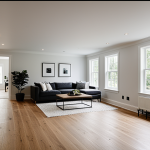Immediate Benefits of Sustainable Home Practices
Sustainable living UK transforms everyday homes through eco-friendly home improvements that elevate comfort and health. By incorporating better insulation, efficient heating systems, and eco-conscious materials, residents enjoy a noticeable boost in indoor air quality and temperature consistency. These upgrades not only improve living quality but also support personal well-being by reducing exposure to pollutants.
The benefits of sustainability also extend to financial savings. Lower energy consumption from improved appliances and smart energy management systems significantly cuts utility bills. For example, upgrading to energy-efficient lighting and appliances can decrease electricity costs by up to 30%.
This might interest you : What are the latest trends in the UK automotive sector?
Additionally, sustainable practices reduce environmental impact by cutting carbon footprints. Water-efficient fixtures and waste reduction strategies lessen the demand on natural resources. Living sustainably promotes a cleaner environment, aligning personal values with wider ecological benefits.
Focusing on these immediate advantages encourages homeowners in the UK to adopt sustainable solutions that deliver both quick financial returns and long-term positive effects on health and the planet.
Also to see : How do you make a classic Cornish pasty from scratch?
Actionable Steps for Energy Efficiency in the UK Home
Energy efficiency UK is a cornerstone of sustainable living UK, offering practical ways to cut energy costs while reducing environmental impact. One of the most effective sustainable home improvements includes installing high-quality insulation and upgrading to double- or triple-glazed windows. These upgrades limit heat loss, maintaining comfortable indoor temperatures year-round and lowering heating expenses.
Switching to LED lighting and energy-efficient appliances adds further savings. LED bulbs use up to 80% less electricity than traditional bulbs and last significantly longer. Energy-efficient appliances also consume less power, directly reducing utility bills and carbon footprints.
Utilising smart technology for energy monitoring is another game-changer. Smart thermostats and energy management systems enable precise control over heating and electricity use. They adapt to household patterns, preventing energy waste without sacrificing comfort. This technological approach aligns with the benefits of sustainability by optimizing consumption and empowering homeowners to make informed decisions.
Combining these measures strengthens sustainable living UK efforts, delivering tangible financial savings and enhancing overall home comfort. It’s a practical roadmap to energy efficiency that benefits both your wallet and the planet.
Effective Waste Reduction Strategies
Minimising household waste is key to waste reduction UK efforts and supports sustainable living UK goals. One effective approach is establishing clear recycling household waste systems. Sorting plastics, paper, glass, and metals separately ensures more materials are diverted from landfills. Many UK councils provide tailored recycling guidelines—following these improves recycling rates significantly.
Composting organic waste transforms food scraps into nutrient-rich soil, reducing waste volume and greenhouse gas emissions. Households can start simple kitchen compost bins or use local community composting schemes.
Choosing reusable products over single-use items also helps. Items like cloth shopping bags, refillable water bottles, and washable food containers reduce dependency on disposable packaging. This shift contributes greatly to sustainable home improvements by cutting waste at the source.
Additionally, minimising packaging waste when shopping means opting for loose produce or products in recyclable containers. Planning purchases and buying in bulk can further reduce packaging waste. These waste reduction UK practices not only lower rubbish output but reinforce personal commitment to sustainability, making a tangible difference on both environmental and financial levels.
Water Conservation Techniques for UK Households
Water conservation UK focuses on cutting unnecessary water use while maintaining household needs. Installing low-flow fixtures and dual-flush toilets is a proven sustainable home improvement that reduces water consumption significantly. Low-flow taps limit water flow without sacrificing pressure, saving thousands of litres annually. Dual-flush toilets offer different flush volumes, giving control over water use depending on waste type.
Harvesting rainwater is another vital strategy. Collecting rainwater via barrels or tanks enables its reuse for garden irrigation or cleaning, cutting reliance on mains water supply. This method aligns with sustainable water use, especially in drier months.
Mindful daily water usage is crucial. Simple actions like turning off taps while brushing teeth, fixing leaks promptly, and using full loads in dishwashers reduce waste effectively. These habits complement physical water-saving devices and contribute to ongoing water conservation UK efforts.
Together, these measures improve environmental impact by easing pressure on water resources. They also provide homeowners with notable financial savings and reinforce the benefits of sustainability by promoting responsible, resourceful living in UK homes.
Immediate Benefits of Sustainable Home Practices
Sustainable living UK offers eco-friendly home improvements that directly enhance daily living quality. Upgrading heating and ventilation systems, for example, results in more consistent indoor temperatures and fresher air. These changes reduce health risks tied to dampness and allergens, promoting well-being.
Financially, the benefits of sustainability are clear. Cutting energy and water use lowers household bills significantly. Energy-efficient appliances and insulation save money long-term by reducing utility expenses. Many UK homeowners report saving hundreds annually after making these adjustments.
Environmental impact also improves with sustainable practices. Reduced carbon footprints from lower energy consumption and waste contribute positively to climate goals. This fosters a sense of personal responsibility while preserving natural resources for future generations.
Together, these immediate advantages—better comfort, cost savings, and ecological benefits—make sustainable home improvements a practical and attractive choice for UK households seeking both tangible rewards and alignment with growing environmental awareness.
Innovative Sustainable Products and Technology Recommendations
Innovative eco-friendly products UK have revolutionised sustainable living UK by offering practical, effective solutions to reduce environmental impact. Solar panels, for example, harness renewable energy and can significantly cut electricity bills while lowering carbon footprints. Coupling solar with home battery storage ensures excess energy is saved and available during peak demand, enhancing energy independence.
Smart thermostats and automated home systems further optimise energy use by adjusting heating and cooling dynamically. These sustainable home technology advancements empower homeowners to control consumption precisely, aligning with energy efficiency goals and delivering notable financial savings.
Choosing UK-sourced sustainable materials and furniture supports local economies and reduces carbon emissions related to transport. These green home innovations not only improve a home’s eco-credentials but also enhance durability and indoor air quality.
Together, these products and technologies offer a future-focused approach to sustainable living UK. They combine cutting-edge functionality with environmental responsibility, helping homeowners achieve lasting benefits in comfort, cost savings, and ecological impact.
Immediate Benefits of Sustainable Home Practices
Sustainable living UK enhances home comfort and health through targeted eco-friendly home improvements. Upgrading insulation, ventilation, and heating systems promotes consistent indoor temperatures and improved air quality. These changes directly reduce exposure to allergens and dampness, supporting better respiratory health and overall well-being.
Financially, the benefits of sustainability emerge with lowered energy and water bills. By cutting consumption through efficient appliances and resource-saving fixtures, households often report noticeable savings. For instance, energy-efficient devices and improved insulation reduce the reliance on costly heating and cooling, generating significant utility bill reductions.
Environmental impact also improves. Sustainable living UK actively lowers carbon emissions by reducing energy demand and waste production. Every reduction in resource use contributes to slowing climate change while conserving vital natural resources.
Overall, these immediate advantages—better comfort, cost savings, and positive environmental effects—make sustainable home improvements practical. They empower UK homeowners to enjoy tangible rewards while fostering personal health and ecological responsibility.







